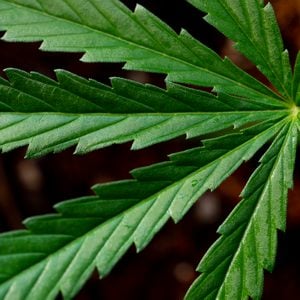Everything You Need to Know About CBD for Weight Loss
Updated: Mar. 24, 2021
Many CBD products claim to spur weight loss, but the scientific evidence isn't there yet.
Our editors and experts handpick every product we feature. We may earn a commission from your purchases.
It’s no secret that marijuana not only makes you high, it can also bring on “the munchies.” But what about cannabidiol or CBD? The marijuana derivative doesn’t make you high and may have numerous health benefits. But does it make you reach for the potato chips and whatever else you can get your hands on to satisfy your suddenly surging appetite?
The answer may surprise you. “CBD suppresses the appetite,” says Martin A. Lee, co-founder and director of Project CBD, a California nonprofit that promotes CBD research, and author of Smoke Signals: A Social History of Marijuana–Medical, Recreational, and Scientific. “It has the opposite effect of what’s typically thought of with THC.”
THC is delta-9-tetrahydrocannabinol, the compound in marijuana that’s responsible for the high and the munchies. (CBD doesn’t make you high.)
Still, we’re a long way from being able to say commercially available CBD products can help you control your weight or shed those extra pounds.
What is CBD?
CBD is found in medical marijuana and is one of two main active ingredients in marijuana. The other is THC.
CBD can also be extracted from the hemp plant, a cousin of the marijuana plant which has much lower levels of THC. Farmers have been able to grow hemp since the 2018 Farm Bill was passed, but only as long as it has no more than 0.3 percent THC. (Here’s more on the difference between CBD vs. THC.)
CBD’s various health benefits (some scientifically validated, some not) have led to an explosion of CBD products. Among them: CBD oil, CBD tinctures, CBD capsules, and edible CBD. Oil can be ingested orally or vaped, but vaping has been linked to lung injuries, says the Centers for Disease Control and Prevention.
Learn more about the risks and benefits of vaping CBD.

CBD and weight loss: The science
One of the few studies done in humans reported that people who used marijuana regularly had a lower body mass index (BMI). The study stopped short of saying that cannabis actually caused a lower BMI or that CBD might have an effect.
Because scientists have not studied CBD extensively in humans, “most of what we have to go on is what CBD does to mice and rats,” says Lee. And the research shows that CBD does indeed suppress rodent appetites.
To understand how CBD may affect hunger and your calorie burn, it’s useful to know about the endocannabinoid system. This is a signaling network in your body that helps regulate metabolism and appetite.
There are two cannabinoid receptors: CB1 and CB2, which act as yin and yang.
“Generally speaking, CB1, if it’s active, promotes food intake, promotes appetite, and enhances senses of smell and taste,” explains Lee. CBD doesn’t actually bind to this receptor but acts as a sort of “dimmer switch” turning down its effect on appetite. People who are obese have more appetite-friendly CB1 receptors.
CB2, on the other hand, acts as a brake on appetite and has been proposed as a drug target. Regular marijuana also seems to act as a brake on CB1, which could help account for the fact that regular users have a lower BMI, despite the munchies. Again, none of this suggests that currently available CBD products can help you slim down.
A diabetes link?
Research from 2012 found that—in obese mice with more of these receptors—muting CB1 limited insulin resistance, which is a major factor in diabetes risk. A study published in 2016 in Diabetes Care found that CBD lowered blood sugar in people with type 2 diabetes. At least one company is investigating whether this is an avenue for drug development.
CBD products and weight loss
There are no formal guidelines on using CBD products and losing weight. That means there are also no recommendations on dosages or which kind of product might be best. While you’re doing your research, check out these CBD products for weight loss that meet our experts’ criteria for quality and safety.
In general, CBD seems to be safe, says Bonni Goldstein, MD, medical director and owner of Cannacenters, a medical practice in Los Angeles and author of Cannabis is Medicine: How Medical Cannabis and CBD are Healing Everything from Anxiety to Chronic Pain. But there can be side effects like nausea, fatigue, irritability, and diarrhea. CBD can also interact with the blood thinner warfarin (Coumadin) and other medications.
“If you’re a person who takes other medications, it’s not a good idea to haphazardly add CBD thinking it will be completely benign,” Dr. Goldstein warns.
Long-term use may also hurt your liver, according to the Food and Drug Administration (FDA).
Is CBD legal?
This is not a simple question. While many states consider CBD legal, the federal government does not. California was the first to legalize medical marijuana. Now another 35 states, the District of Columbia, Guam, Puerto Rico, and the U.S. Virgin Islands have followed suit, according to the National Conference of State Legislatures.
National laws are another matter. The U.S. Drug Enforcement Administration considers marijuana and its components Schedule 1 substances, which are “drugs of abuse.” There is a push to legalize marijuana at the national level. A bill to take marijuana off the Controlled Substances Act passed the House late in 2020 but has not yet reached the Senate.
The FDA has approved only one CBD-derived drug. That’s Epidiolex, to treat rare forms of pediatric epilepsy.
The last word
With more than 42 percent of the U.S. population obese, the country is desperate for effective modes of losing weight. Right now, experts recommend diet and exercise above all. But for some people, it’s hard to sustain lifestyle changes for long periods of time. Meanwhile, there are few drugs available to lower BMI.
The number of CBD products, including those that claim to lower weight, is exploding. So far, though, the evidence is far behind. “CBD is associated with decreasing appetite but I can’t say it correlates to weight loss,” says Lee.



